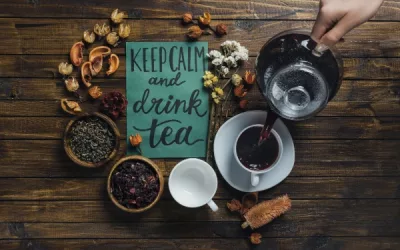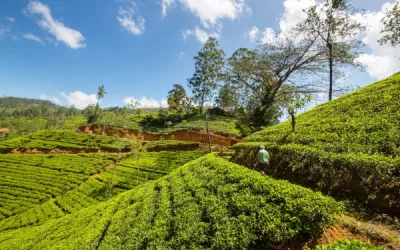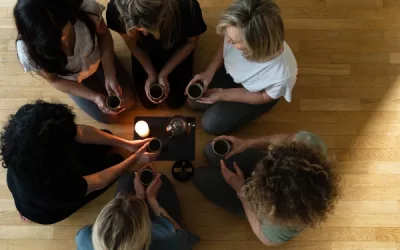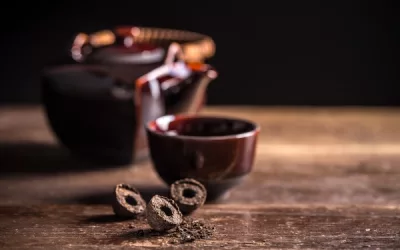Does your afternoon cup of tea leave you questioning your hydration levels? While tea is a cherished ritual for many, the myth that it’s dehydrating persists. Understanding the relationship between tea and hydration is crucial for those who want to enjoy their brew without compromising their health. This article will delve into the facts and myths surrounding tea’s hydrating effects, offering insights on consumption amounts, types of tea, and expert opinions, ultimately revealing whether your favourite beverage helps or hinders your hydration goals.
Table of Content
- What is the relationship between tea and hydration?
- Does tea dehydrate you?
- How much tea is considered safe for hydration?
- What are the myths surrounding tea and dehydration?
- Can tea consumption affect athletes’ hydration?
- What are the hydration benefits of herbal teas?
- How can one maintain hydration while enjoying tea?
- What do experts say about tea and hydration?
- Conclusion
What is the relationship between tea and hydration?
The relationship between tea and hydration is not black and white, as different types of tea and individual hydration needs can significantly influence the effects.
Let’s break it down further.
Primarily, the caffeine content in tea plays a significant role in how it affects hydration. Caffeine has diuretic properties, meaning it can increase urine production.
However, this doesn’t mean tea will necessarily dehydrate you. The fluid you consume alongside the caffeine usually compensates for the mild diuretic effect. Interestingly, different types of tea, from black to herbal, contain varying caffeine levels and hydration benefits.
Other factors like how much tea you drink and your personal hydration needs also come into play. Some individuals might be more sensitive to caffeine, while others can handle larger amounts without significant dehydration risks.
Given these complexities, it becomes imperative to explore how caffeine in tea affects hydration, the hydration benefits of various tea types, and individual factors influencing tea’s impact on hydration.
How does caffeine in tea affect hydration?
Caffeine often carries a bad reputation regarding hydration, but the story is more nuanced. When you consume tea, you’re not just taking in caffeine – you’re also ingesting a considerable amount of water. The presence of caffeine can slightly increase urine production, but the water in the tea largely balances this out.
- Caffeine level: Tea generally has less caffeine than coffee – about 20-60 mg per cup compared to 95 mg in a typical cup of coffee.
- Diuretic effect: The diuretic effect of caffeine is more pronounced at higher doses (over 300 mg per day).
- Water content: A single cup of tea contributes significantly to your daily fluid intake.
- Tolerance: Regular tea drinkers may build a tolerance to caffeine, reducing its diuretic impact.
- Balance: The fluid intake from tea typically offsets the mild diuretic effects of caffeine.
While caffeine has a diuretic effect, the water content in tea makes up for it. Unless you consume tea in exceptionally high amounts, it won’t drastically affect your hydration levels.
What are the hydration benefits of different types of tea?
Different teas offer varied hydration benefits, catering to diverse preferences and needs. From caffeinated black tea to caffeine-free herbal infusions, each type has unique attributes affecting hydration.
- Black tea: Contains the highest caffeine but still contributes positively to fluid intake.
- Green tea: Offers moderate caffeine levels and is rich in antioxidants.
- White tea: Similar to green tea, with slightly less caffeine.
- Oolong tea: Falls between black and green tea in terms of caffeine content.
- Herbal tea: Usually caffeine-free and highly hydrating, making it a fantastic option for hydration.
Tea, in its various forms, not only hydrates but also delivers additional benefits like antioxidants from green and white teas. Herbal teas, being caffeine-free, offer a great alternative for those concerned about caffeine’s impact on hydration.
How do individual factors influence tea’s impact on hydration?
Individual factors such as tolerance to caffeine, overall diet, and specific hydration needs can influence how tea impacts your hydration levels. Everyone’s body responds differently to caffeine and hydration.
- Caffeine sensitivity: Some might be more sensitive and experience stronger diuretic effects.
- Dietary habits: Overall fluid intake and electrolyte balance play a role.
- Health conditions: Conditions like kidney issues might affect how the body handles caffeine.
- Exercise level: Active individuals may need more hydration and can benefit from the fluid content in tea.
- Regular consumption: Regular tea drinkers might develop resistance to caffeine’s diuretic effects.
These factors immensely contribute to how your body responds to tea. For instance, a physically active person might appreciate the hydration benefits more, while someone with high caffeine sensitivity might need to stick to lower-caffeine or herbal teas.
In the early 1700s, tea became a cultural staple in Britain. Peter the Great of Russia embraced tea during his reign, importing vast quantities despite the long journey inland. Tea would be traded across Mongolia and Siberia, and it wasn’t merely viewed as a beverage – it became an emblem of status and a luxurious ritual. The social aspects of tea drinking reinforced community bonding, bringing people together, almost highlighting its ‘social hydration’ benefits, if you will.
On a personal note, sipping a comforting cup of green tea has always been my way to ‘hydrate with benefits’. It’s a great feeling knowing that this habit contributes positively to my hydration needs while also offering rich antioxidants.
Whether I’m winding down with a fragrant cup of chamomile in the evening or kickstarting my day with a refreshing mint tea, I’ve found that tea, in its myriad forms, keeps me hydrated and invigorated.
Does tea dehydrate you?
Many people worry if drinking tea can leave them feeling dehydrated. The main concern arises due to the caffeine content in tea. Caffeine, known for its diuretic properties, may make some think it could cause dehydration. However, you need to know the full story before making a decision on your tea habits.
Tea does contain caffeine, but in much lower quantities compared to coffee. This means its diuretic effect is mild. Studies have shown that the overall hydrating effect of tea balances out any minimal loss caused by its caffeine content. So, drinking tea in moderation won’t dehydrate you; it can actually help with your daily fluid intake.
Does tea count towards daily water intake?
Yes, tea does contribute to your daily water intake. When you drink tea, you’re still consuming water along with other beneficial compounds. Here’s a table to give you a clearer picture of how different beverages stack up in terms of fluid contributions and hydration effects.
| Beverage Type | Average Fluid Content Per Serving (ml) | Hydration Effect |
|---|---|---|
| Plain Water | 250 | Excellent |
| Green Tea | 240 | Good |
| Black Tea | 240 | Good |
| Coffee | 240 | Moderate (due to higher caffeine) |
| Soft Drinks | 330 | Poor (contains sugar and caffeine) |
| Herbal Tea | 240 | Excellent (no caffeine) |
| Sports Drinks | 500 | Good (electrolytes boost hydration) |
This table compares how different drinks measure up in hydrating your body. By understanding the average fluid content per serving and the hydration effect, you can see that tea (green, black, and herbal) contributes well to your daily fluid intake. Herbal teas, in particular, provide an excellent hydration effect because they lack caffeine.
Is drinking tea better than water?
Drinking tea and water both serve to keep you hydrated, but each has additional benefits that might sway your choice. Water is a pure hydrating source without any added ingredients. Meanwhile, tea offers more than just hydration.
- Contains antioxidants, known as flavonoids, which help fight free radicals.
- Provides small amounts of minerals like potassium and magnesium.
- Low in calories, especially if consumed without sugar or milk.
- Contains various additional flavours that can make your drinking experience more enjoyable.
While water is the best beverage for straightforward hydration without added substances, tea brings along extra health benefits that make it a strong contender in your beverage choices.
What are the side effects of drinking too much tea?
Although tea has many perks, like any other food or drink, overconsumption can bring about some downsides. Here are the potential side effects if you drink too much tea.
- May cause digestive issues due to tannins.
- Can lead to headaches and dizziness from caffeine.
- Might affect iron absorption.
- Could result in sleep disturbances.
- Might stain your teeth over time due to its dark pigments.
To avoid these problems, it’s important to enjoy tea in moderation. Listening to your body’s needs and balancing your intake with other fluids and nutrients is always a smart move.
In the mid-19th century, the Victorian era experienced a major boom in tea consumption. The British Empire imported vast quantities of tea from China and later India. Queen Victoria herself was known for her love of both tea and tea parties.
Tea became an integral part of British culture and social life, leading to the traditional “afternoon tea”. The act of drinking tea was not only about flavour or hydration but a significant social event. People from all social classes found a sense of unity and relaxation over a cup of tea, changing the very fabric of British daily routines.
Just last week, I found myself sipping a soothing cup of chamomile tea in the evening. I had been reading up on hydration and stumbled upon this debate of whether tea hydrates or dehydrates you. Experimenting on myself, I noticed that I felt refreshed and calm after a few cups throughout the day.
Judging by my thirst levels and energy, tea didn’t seem to dehydrate me at all. In fact, I felt more collected and hydrated, debunking any prior misconceptions I had about tea’s hydrating capabilities. Whether it’s green tea in the morning or herbal tea at bedtime, it now feels like a beneficial and lovely addition to my daily hydration routine.
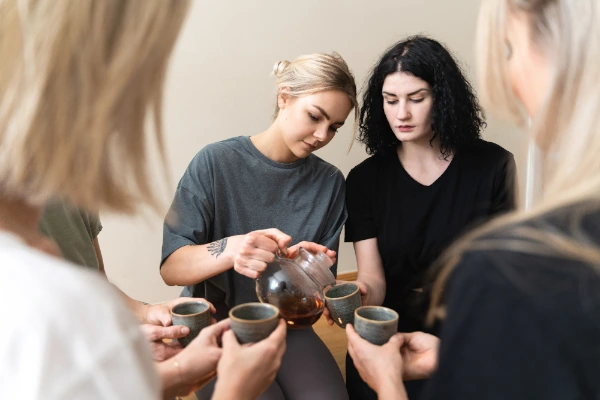
How much tea is considered safe for hydration?
If you’ve ever wondered whether your beloved cuppa is secretly sabotaging your hydration levels, you’re not alone. Let’s spill the tea—pun very much intended—about how much of this delightful beverage is just the right amount for keeping you well-hydrated and feeling fabulous.
First up, moderation is key pretty much for everything in life, from chocolate cake to screen time. Tea is no different. The type of tea also matters. Some teas, like green tea, are lower in caffeine and might be more hydrating compared to stronger brews like black tea. Plus, personal health considerations come into play. If you’ve got kidney issues or are sensitive to caffeine, you’ll want to be extra cautious.
Keeping an eye on your body’s signals is another useful trick. Monitoring hydration by noting the colour of your urine can give quick feedback. It sounds kind of gross, but if it’s light and pale, you’re likely hydrated!
What is the recommended daily limit for tea consumption?
So, you’re all about that life—sipping tea morning, noon, and night. But how much is too much?
- Aim for 3 to 5 cups a day. Seriously, that should be your max if you want to stay comfortably hydrated.
- If you’re sensitive to caffeine, consider sticking to the lower end of this range.
- Space out your cups throughout the day. Chugging 5 cups in one go isn’t going to win you any hydration awards.
- Pay attention to your body’s signals. Feeling jittery? Maybe it’s time to switch to something less thrilling, like water.
Drinking tea isn’t a marathon. Keep it leisurely paced and you’ll enjoy every sip without compromising your hydration levels.
Are there specific types of tea that are better for hydration?
Not all teas are created equal, darling.
- Green tea: Lower in caffeine, rich in antioxidants, all-around good for you.
- Herbal teas: Practically caffeine-free and come in so many flavours, you’ll never get bored.
- Black tea: Higher in caffeine but still hydrating if consumed in moderation.
- White tea: Lightly caffeinated and quite refreshing.
- Rooibos tea: Caffeine-free and packed with nutrients.
Your best bet for staying hydrated? Stick with herbal or green teas mostly, and save the stronger stuff like black tea for when you need that extra oomph to get through the day.
How can one monitor their hydration levels while consuming tea?
Now that you’re clued in on the types of tea, let’s talk about keeping tabs on your hydration levels.
- Check your pee colour. Pale yellow? You’re good to go. Dark yellow to amber? Time to up your water intake.
- Monitor how you feel. Feeling light-headed, dizzy, or just plain tired? You might be dehydrated.
- Keep a hydration log. Yes, it sounds geeky, but it works. Note down how much tea and water you’re drinking.
- Watch your skin. Dry, flaky, or tight skin can be signs of dehydration.
- Listen to your thirst. If you’re thirsty, your body is already asking for more fluids.
Stay vigilant, and you can keep enjoying your tea without any of the guilt.
In the world of historical tea enthusiasts, none stand out like Catherine of Braganza, the Portuguese princess who married King Charles II of England. Catherine is credited with popularising tea in England during the 17th century.
Picture this: a royal figure savouring her afternoon tea, inadvertently setting a trend that has lasted centuries. Thanks to her, tea time has become a cherished ritual, reassuring us that tea can be part of a healthy, balanced life—just keep moderation in mind!
What are the myths surrounding tea and dehydration?
If you’ve ever thought tea might shrivel you up like a raisin, you’re not alone. Myths about tea leading to dehydration are as common as a builder’s brew on a rainy day. Let’s spill the tea and separate fact from fiction.
Misconceptions about dehydration stem from the idea that because tea contains caffeine—a diuretic—it must dry you out. But how accurate is this really? Spoiler: not very. Scientific evidence has brewed a different cup.
Researchers have shown that the fluid intake from tea actually contributes to your daily hydration. So, while tea may make you visit the loo more frequently, it doesn’t deplete your hydration levels in the grand scheme of things.
Alright, now that we know tea isn’t the boogeyman it’s painted to be, let’s delve deeper into where these myths come from. Cultural beliefs, media influences, and expert opinions are all in the mix.
From grandma’s warnings that tea will riddle you with wrinkles to tabloids declaring it the devil’s drink, misinformation spreads fast. Thankfully, experts like nutritionists have weighed in to sweep these rumours down the drain.
What are the most prevalent myths about tea and hydration?
A lot of misconceptions have seeped into general knowledge about tea and hydration. Here are some of the most widespread myths:
- Tea dehydrates you: People often assume that due to caffeine, tea must be dehydrating. It’s not true!
- All caffeinated beverages dry you out: This generalisation isn’t accurate. The water you consume with your tea does contribute to your fluid intake.
- Black tea is worse than green tea: All types of tea contain similar amounts of caffeine when compared, none are devilishly dehydrating.
- Tea isn’t as hydrating as water: Liquids are liquids. Tea, with its water base, hydrates almost as well as plain old H2O.
- Herbal teas don’t count: Any tea, caffeinated or not, contributes to hydration.
These myths spread faster than a cold in an office, perpetuating the false notion that tea is your hydration’s arch-nemesis.
How does scientific evidence debunk these myths?
Science loves to crash a good myth party. Research has continually shown that tea does not dehydrate you.
- Caffeine Levels: Though caffeine in tea can be a mild diuretic, the amounts found in tea are insufficient to cause dehydration.
- Hydration Studies: Several studies indicate tea’s hydrating benefits are akin to water if consumed moderately.
- Fluid Intake: The fluids consumed through tea contribute significantly to overall hydration.
- Bioavailable Water: The water in tea is just as available to the body as plain water for hydration purposes.
- Balanced Components: The natural compounds in tea can even have antioxidant benefits, debunking the hydration hit.
Science packs a punch. It shows that the hydration benefits of tea far outweigh any minor diuretic effect caffeine might have.
What role does media play in spreading misinformation about tea?
The media can be as good at brewing misinformation as it is at delivering news. Here’s how it plays a part:
- Sensational Headlines: Catchy but misleading headlines make for eye-grabbing but inaccurate stories.
- Exaggeration: Media outlets often exaggerate study results, turning “mild diuretic effect” into “tea drains your body dry.”
- Lack of Nuance: Articles often miss the nuances of scientific studies, leading to overgeneralisation.
- Celebrity Influence: Statements from celebrities and influencers can spread unchecked misinformation like wildfire.
- Old Wives’ Tales: Media can perpetuate age-old myths without verifying the science, continuing the cycle of misinformation.
Next time you read something scandalous about your beloved cuppa, check the facts before you panic.
Did you know that some of the earliest debates about the effects of tea actually go back to the 17th century? Once upon a time, Britain went crazy for tea after it was introduced by the Dutch East India Company. But not everyone was a fan.
In 1674, the Women’s Petition Against Coffee claimed that both coffee and tea were making men unfit for, let’s call it, “prolonged activities.” Fast forward a few centuries, and we’re still trying to get our facts straight! So, cheers to historical lessons—it’s not the tea, it’s the hyperbole that dehydrates our brains.
Can tea consumption affect athletes’ hydration?
Drinking tea when you’re an athlete is like choosing your game-day outfit—it can make all the difference. Athletes have specific hydration needs and different types of tea can either help or hurt. So, before you sip that cuppa thinking it’s doing you good, let’s dive into what you need to know.
Athletes sweat—like, a lot. Hence, the dehydration game is not one to be taken lightly. While water is the MVP of hydration, tea steps in like a savvy substitute and shakes things up. Now, here’s the kicker: not all teas are created equal, especially when it comes to performance, recovery, and hydration.
How does tea consumption impact athletic performance?
Tea and athletic performance have a dynamic relationship; let’s see how they do the tango.
- Hydration levels: While pure water is the hydration king, certain teas inch close to holding that crown. Herbal and non-caffeinated teas hydrate almost like water, so kudos for that.
- Caffeine influence: Caffeine, often found in black, green, and oolong teas, can be both friend and foe. It gives you that “get-up-and-go” but, overconsumed, can lead to dehydration.
- Performance boost: Besides being a decent hydrator, caffeine in tea can enhance focus and endurance in moderate amounts. Think of it as your pre-game pep talk.
- Nutrient benefits: Many teas come packed with antioxidants like catechins and polyphenols, speeding up your recovery and reducing muscle soreness.
- Thermic effect: It slightly raises your body temperature, subtly aiding calorie burn, making it a sneaky little helper for weight management.
So, if you’re guzzling down tea in place of water, you’re doing it right, but with a bit of caution, especially where caffeine is involved.
What types of tea are recommended for athletes?
Choosing the right tea for your athletic endeavours is like picking the best gear—meticulous and rewarding.
- Herbal teas: Think chamomile, mint, and rooibos. No caffeine, maximum hydration.
- Green tea: Minimal caffeine, loaded with antioxidants. Good for pre-exercise.
- White tea: A mild caffeine kick with plenty of antioxidants—great for post-exercise relaxation.
- Ginger tea: Natural anti-inflammatory properties, aiding recovery.
- Matcha: High in antioxidants, offers sustained energy but don’t overdo the caffeine.
When sipping post-training, aim for low-to-no caffeine varieties. You want hydration and recovery, not a sleepless night re-living every single missed shot or move.
How should athletes balance tea consumption with hydration?
Balancing tea and hydration is like mastering life—details matter.
- Know your limits: Be aware of the caffeine content in your tea. Too much and you’ll be dehydrated before you know it.
- Mix and match: Alternate between caffeinated and herbal teas to keep hydration levels stable.
- Timing is key: Save the caffeine-laden teas for the morning or pre-training bursts. Post-exercise, go herbal.
- Hydrate, hydrate, hydrate: Don’t replace water entirely with tea. Make sure H2O is still your main squeeze.
- Listen to your body: If you’re feeling dry-mouthed or unusually thirsty, it’s a sign you need to adjust your tea consumption.
Remember, it’s all about balance. Become as strategic with your tea drinking as you are with your training routines and you’ll be golden.
Now, a bit of history to reward your persevering mind. In 1908, Sir Ernest Shackleton set sail for the South Pole with an array of tea on board. Think of it: extreme cold, unfathomable conditions, and British tenacity, buoyed by the humble cup of tea.
The crew’s morale, hydration, and alertness were all kept in check by their tea supply. So, next time you sip a brew before hitting the gym, remember that it’s been fuelling adventures long before it ever thought about your hydration levels!
What are the hydration benefits of herbal teas?
Let’s dive into the world of herbal teas and see how they can help you stay hydrated. First off, herbal teas deserve a standing ovation for their contribution to hydration. Unlike traditional teas, these concoctions are caffeine-free and brimming with benefits.
To our hydration-hungry friends, herbal teas are like that friend who shows up with a water bottle to every occasion – serious hydration enthusiasts. These teas not only keep you hydrated but also bring a party of nutrients, antioxidants, and flavours to your cup. Whether you’re sipping on chamomile, peppermint, or hibiscus, you’re in for a treat that’s both tasty and beneficial.
Which herbal teas are best for hydration?
Not all herbal teas are created equal when it comes to hydration. Some teas really know how to work wonders with water.
- Chamomile Tea: Best known for its relaxing properties, chamomile also helps keep you hydrated without the jitters of caffeine.
- Peppermint Tea: Refreshing and invigorating, peppermint tea is excellent for hydration and can even help with digestion.
- Hibiscus Tea: This deep red tea is not only packed with antioxidants but is also great for staying hydrated.
- Rooibos Tea: Rich in minerals and completely caffeine-free, rooibos is your go-to for hydration and a boost of nutrients.
- Ginger Tea: Ginger doesn’t just spice things up; it also helps maintain your hydration levels while offering anti-inflammatory benefits.
Take a sip of these herbal wonders and wave goodbye to dehydration.
How do herbal teas compare to traditional teas in terms of hydration?
When pitting herbal teas against traditional teas, there are a few things to consider. Traditional teas like black, green, and oolong contain caffeine, which can act as a mild diuretic. While they do hydrate, the caffeine might cause you to visit the loo more often.
- Caffeine Content: Herbal teas are caffeine-free, making them better for sustained hydration.
- Diuretic Effect: Traditional teas can have a slight diuretic effect due to caffeine, whereas herbal teas do not.
- Calming Effect: Many herbal teas, such as chamomile and lavender, can have a soothing effect without affecting hydration.
- Temperature Versatility: Both traditional and herbal teas can be enjoyed hot or cold, although herbal teas often have a wider variety of refreshing iced options.
So, while traditional teas do contribute to hydration, herbal teas take the crown for consistent hydration without the bathroom breaks.
What additional health benefits do herbal teas provide?
Hydration is just the tip of the herbal tea iceberg – there’s more to these bevvies than meets the eye.
- Anti-inflammatory Properties: Teas like ginger and turmeric are known for reducing inflammation.
- Antioxidants: Herbal teas like hibiscus and rooibos are packed with antioxidants which can fight off free radicals.
- Digestive Health: Peppermint and ginger teas aid digestion, helping you feel your best.
- Calming Effects: Chamomile and lavender teas can help reduce anxiety and aid in sleep.
- Immune Support: Echinacea and elderberry teas can provide a boost to your immune system.
In short, herbal teas are like the Swiss army knife of beverages – offering a variety of health benefits beyond just quenching your thirst.
In the 19th century, Captain Frederick Marryat, a British Royal Navy officer, travelled to South America and observed the native practice of drinking yerba mate. This herbal tea, rich in vitamins, minerals, and antioxidants, left a strong impression on him.
Its consumption by the natives who were robust and healthy highlighted the hydration and nutritional benefits of herbal teas, contributing to its increasing popularity in Europe. It’s a testament to the enduring value of herbal teas in not only promoting hydration but also enhancing overall well-being.
How can one maintain hydration while enjoying tea?
Here’s the tea – pun intended – on how you can sip your favourite brew and stay as hydrated as a camel in an oasis. Let’s dive into some practical tips and tricks to keep you hydrated while still enjoying your cuppa, from managing your water intake to timing your tea consumption.
Staying hydrated is essential, whether you’re running a marathon or binging the latest series on Netflix. But when you’re fond of tea, things can get a tad tricky since tea contains caffeine, which is a mild diuretic. However, you don’t need to toss your Earl Grey just yet. Let’s explore how you can maintain that perfect hydration balance while sipping your favourite tea.
What strategies can help balance tea consumption and hydration?
So, you love tea but don’t want to be a dried-up prune? Here are some strategies that will keep you hydrated without having to give up your beloved brew:
- Balance tea with water: For every cup of tea, have a glass of water. This keeps your hydration levels in check and counters the mild diuretic effect of caffeine.
- Limit high-caffeine teas: Opt for herbal teas or varieties with lower caffeine content. Peppermint, chamomile, and rooibos are excellent choices that are easier on the hydration front.
- Timed hydration breaks: Don’t just rely on tea. Schedule water breaks throughout your day. Setting reminders can be a lifesaver for balancing both tea and hydration.
- Include hydrating foods: Munch on water-rich snacks like cucumbers, watermelon, and oranges. These can supplement your liquid intake.
- Monitor your caffeine intake: Keep an eye on how much caffeine you consume in total, including from other sources like coffee and soft drinks. This helps prevent excessive dehydration.
By following these strategies, you’ll not only enjoy your tea but also stay adequately hydrated. The key is balance – nobody said you had to give up tea!
How can one assess their hydration levels throughout the day?
Think you might be as parched as the Sahara? Here’s how to stay on top of your hydration game:
- Check your urine colour: Yes, I know, not a pleasant topic, but it’s effective. Light yellow means you’re well-hydrated; dark yellow or amber indicates you need more fluids.
- Thirst levels: Feel thirsty? Your body is already on its way to dehydration. Don’t wait to feel parched; keep sipping water throughout the day.
- Skin elasticity test: Gently pinch the skin on the back of your hand. If it snaps back quickly, you’re good. If it’s slow, you might need a hydration top-up.
- Mouth dryness: A dry mouth is one of the simplest and earliest signs of dehydration. Keep a water bottle handy.
- Fatigue and headaches: Feeling unusually tired or fighting a headache? These are classic signs of dehydration. A glass of water might be the fix you need.
By keeping an eye on these hydration indicators, you’ll know when to take action. It’s all about staying aware and proactive.
What are the best times to consume tea for optimal hydration?
Timing is everything, even when it comes to your tea breaks. Here’s the lowdown on the best times for your tea consumption:
- Morning brew: Start your day with a cup but follow it up with a glass of water. It’ll give you the caffeine boost without dehydration.
- Mid-morning sip: Perfect for a pick-me-up. Again, balance with a water chaser to maintain hydration.
- Afternoon tea: The classic. Just ensure you’re continuing with your water intake throughout the afternoon.
- Evening relaxation: Opt for herbal or lower-caffeine teas in the evening to wind down without impacting your hydration overnight.
- Post-exercise tea: If you love tea after a workout, have it but replenish with ample water to recover your hydration levels.
By timing your tea consumption wisely, you’ll enjoy every sip while keeping your hydration in check.
In the 18th century, the British East India Company held a monopoly on tea imports to England, making tea a prized commodity and a staple in British life. But here’s a juicy tidbit: sailors were allotted tea rations and encouraged to drink it despite the diuretic effect because its preparation with boiled water reduced waterborne diseases.
Essentially, tea was the OG convenient and somewhat safe beverage, even for hydration. So, sip your tea and channel your inner sailor – hydration included!
What do experts say about tea and hydration?
When it comes to sipping that delightful brew, many folks wonder: “Is this cup of tea doing wonders or secretly turning me into a desiccated prune?” The chatter among experts is spicy, like a good chai. Research findings, expert interviews, and guidelines from health organisations shed light on whether our beloved cuppa is friend or foe to your hydration levels.
First things first, let’s break down the robust opinions of those white-coat-wearing know-it-alls. Spoiler alert: it’s not as straightforward as you might think.
What do health experts recommend regarding tea consumption?
Health experts generally agree on one thing – moderation. Just because you adore tea doesn’t mean you should guzzle it like water from a fire hose.
- Moderation is Key: Most agree that around 3-4 cups a day is the sweet spot for most people.
- Type Matters: Green tea, herbal tea, and black tea have different levels of caffeine, impacting hydration differently.
- Time of Day: Afternoon tea is ideal. Chugging black tea before bed might leave you more jittery than hydrated.
- Balanced Diet: Include other fluids too. Think water, soups, or juicy fruits.
- Listen to Your Body: Everyone’s different. If you feel parched, drink more water.
Notice the emphasis on variety? Mix up your beverage routine. As alluring as tea is, it shouldn’t be your sole drink of choice. Just picture yourself as a well-hydrated King or Queen of England, benevolently sipping tea alongside a plethora of other fluids.
How do expert opinions vary on tea and hydration?
Oh boy, here’s where things take a twist. Experts don’t always sing in perfect harmony about tea and hydration. It’s a bit like watching a debate at Hyde Park’s Speaker’s Corner.
- Caffeine Concerns: Some experts worry caffeine acts as a diuretic, flushing water out of your system faster than you can say ‘tea’!
- Fluid Balance: Others point out that the fluid content in tea offsets any minor diuretic effect.
- Body’s Adaptation: There’re whispers that regular tea drinkers adapt to caffeine, rendering its diuretic powers moot.
It appears the consensus is – drumroll, please – that tea’s hydrating powers far outweigh its potential downsides when consumed in moderation. You won’t end up a shrivelled mess if you keep your tea consumption within the aforementioned reasonable limits.
What are the key takeaways from expert research on this topic?
Time to zoom in on those juicy snippets from expert research. The nitty-gritty details can be refreshing and informative.
- Hydrating Effect Proven: Studies have shown tea hydrates just as well as water.
- Caffeine’s Impact is Mild: Its diuretic effect is minor compared to the hydrating fluids.
- Long-Term Benefits: Regular tea consumption can even improve heart health and provide antioxidants.
- Variety Helps: Mixing types of tea (green, black, herbal) can provide a balanced intake of nutrients and hydration benefits.
- Hydration Myths Debunked: The idea that tea dehydrates is mostly a myth unless consumed in grossly large amounts.
So, next time someone shoots you a dubious look as you brew your third cup of the day, flash them these tidy facts. Tea’s more likely to rejuvenate than desiccate you.
Picture this: In the late 1600s, Catherine of Braganza, the Portuguese queen married to King Charles II, made tea an essential part of British court life. Historians think she consumed it not just for its flavour but also for its perceived health benefits. Imagine the dismay if they’d known we’d fret over its hydrating properties centuries later. Yet, there she was—maintaining social poise and, apparently, hydration—one sophisticated teacup at a time.
And there you have it! Enjoy your cup of tea with the comfort that it’s more likely treating you well than drying you out. Cheers!
Conclusion
As we delve into the intricate relationship between tea and hydration, it’s essential to recognise the multifaceted nature of this topic. Throughout the article, we’ve illuminated the nuances of tea’s caffeine content, its considerable fluid contributions, and the personal factors that tailor individual hydration needs. We’ve explored how not all teas are created equal, with different varieties offering unique hydration benefits and the importance of moderation being a common thread.
Understanding the broader implications of these findings is key. Indeed, the perception that tea dehydrates us is largely a myth, debunked by scientific evidence and expert opinion. Rather than detracting from our hydration, certain types of tea, such as herbal infusions, can enhance our overall fluid intake while also providing additional health benefits.
If you’re looking to cultivate a hydration-friendly tea-drinking habit, I encourage you to consider practical strategies, such as balancing tea consumption with adequate water intake and timing your brews for optimal hydration outcomes. Monitoring your hydration levels can further empower you in your choices, ensuring you reap the rewards of your tea-drinking rituals while maintaining your health.
In wrapping up, I reflect on a thought-provoking comment from a study on hydration, which noted: “A well-hydrated body is like a well-tuned instrument; everything works harmoniously.” As you sip your next cup of tea, I invite you to ponder how your choices contribute to this harmony. Are you ready to embrace the delightful balance between enjoying tea and nurturing your hydration needs?
Resources
- Herbal Teas and their Health Benefits: A Scoping Review
- Narrative Review of Hydration and Selected Health Outcomes in the General Population
- Hydration in sport and exercise: water, sports drinks and other drinks
- Hydration and Nutrition in Athletes
- No Evidence of Dehydration with Moderate Daily Coffee Intake: A Counterbalanced Cross-Over Study in a Free-Living Population
- Effects of Caffeine on Hydration Status: Evidence Analysis Review
- Water, drinks and hydration – NHS
- How Much Water You Should Drink Every Day – Cleveland Clinic Health
- Does tea dehydrate you? What beverages count for water intake




